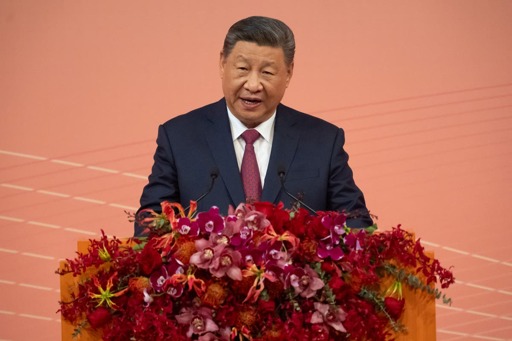Summary
Chinese President Xi Jinping reiterated in his New Year’s speech that Taiwan’s “reunification” with China is inevitable.
China has escalated military activity around Taiwan, including frequent incursions near the island and sanctions on U.S.-linked companies over arms sales to Taipei.
Taiwanese President Lai Ching-te rejected Beijing’s claims, stating Taiwan’s future can only be decided by its people.
Lai also criticized China’s restrictions on travel and education exchanges with Taiwan, calling for dignified, reciprocal relations based on goodwill and equality.



I dont get the downvotes. China is state controlled capitalism with all the negatives of capitalism like extreme wealth disparity. China couldnt be further from a stateless, classless moneyless society that communism aspires.
There are a lot of similarities between the PRC’s economic model and the NEP, but this doesn’t mean it’s Capitalist, nor is it accurate to say it has all of the negatives of Capitalism. The PRC is in the early stages of Socialism, and this is shown through strong government control of the Private Sector, a robust and expansive Public Sector, and large-scale Central Planning. You’re correct that it is far from being Stateless, Classless, or Moneyless, but at the same time you have to acknowledge that they simply can’t push the “Communism button” and establish a global Republic of full Public Ownership and Central Planning and an established system of labor vouchers or other such non-money form of accounting.
The process of building Communism is long and drawn out after the revolution, and must be a global process as well.
Yes, all Socialist societies should work towards the eventual end of commodity production, however neither Marx nor Engels figured that it could be done away with immediately. From Principles of Communism:
From Socialism: Utopian and Scientific:
Ultimately, it remains a contradiction that eventually the PRC will have to do away with. However, this is a gradual process that can only be accomplished through trial and error. There is a Chinese proverb often referenced in the CPC, that “one must cross the river by feeling for the stones,” and this reflects their cautious strategy. Moreover, we must understand that the USSR fell, and the CPC saw that in real time. Not wanting to repeat the Cultural Revolution nor the fall of the USSR, the CPC adjusted their practice. It remains to be seen what will happen in 10, 20, 50, 100 years, of course, but currently the CPC is behaving in a manner we can understand as Marxist.
The USSR was just as capitalist as the PRC. Because it had generalized commodity production and wage-labor. You can’t have a socialist mode of production in just one country, as the interaction with capitalist countries will infect your system.
The PRC is a highly technocratic advanced capitalist democracy, and yes, it will likely outpace the west in a number of key statistics over time, that doesn’t make it socialist, because the productive mode is capitalism.
You can’t have Communism in one country, as Communism must be international, global, and have fully eradicated Private Property and Commodity Production. You absolutely can have Socialism in one country, however. Socialism is a transitional status towards Communism from Capitalism, and is dependent upon human supremacy over Capital and a trajectory towards further collectivization and the dominance of the Public Sector over the Private not in percentage, but power.
To take the opposite claim, that you can’t have Socialism in one country, is to determine that you must call a fully publicly owned economy “Capitalist” despite eradication of Markets and commodity production in general. Further, to claim that Socialism can only exist internationally is to make the asserted claim that a 99% publicly owned and planned economy is actually dominated by the 1% in the market sector and is thus Capitalist, these are anti-dialectical judgements.
Further, revisiting Marx, he considered countries where feudalism was still the majority of the economy yet Capitalism well on its way to dominate the entire economy to already be Capitalist. The dialectical method acknowledges that there is nearly no such thing as a “pure” system, to require “purity” for Socialism alone and not any of the previous Modes of Production erases the foundation of Scientific Socialism.
All in all, I am getting a definite Trotskyist vibe from your analysis and that would explain your stances a bit more, but I really do wonder in particular how you personally reconcile Dialectics with an anti-dialectical approach to Socialism specifically. The productive mode does not depend on a “one drop” rule of commodity production, but the dominant mode and the trajectory of the system as a whole.
I suggest reading What is Socialism? Here’s a relevant snippet from it talking about your exact argument: